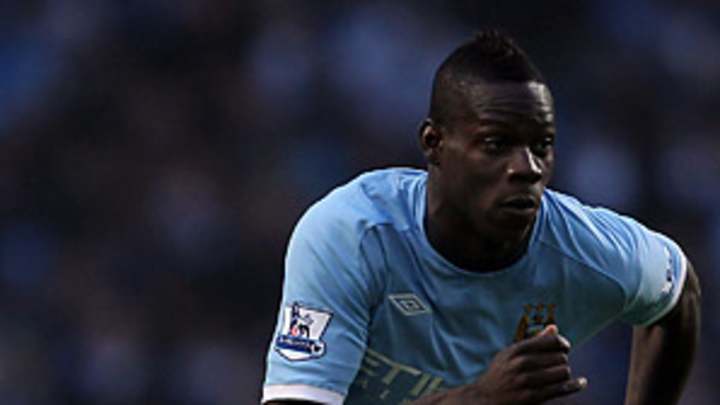Man City's Balotelli still an enigma

We are what formed us. Some of it is nature: height, athleticism, race, intelligence, agility, etc. Some of it is nurture: where you grew up, what your family was like, how you were raised and so on.
It's not different for Mario Balotelli. Except his combination of factors, both nature and nurture, are close to unique. And that may help explain why he is, at once, one of the hottest prospects in the world game and a walking enigma, whose behavior makes some wonder if he's playing with a full deck.
Balotelli only turned 20 last August and yet his laundry list of deeds and misdeeds could already fill a midsized biography.
When cops pulled him over in his sports car last summer (for no discernible reason) and found around $8500 in cash, they asked him why had so much money. He replied: "Because I'm rich." Cue general outrage about arrogant spoiled footballers. (In fact, Balotelli, who did not yet have an ATM card or checking account, had just withdrawn money to pay bills in his new house.)
When he said he did not know who Jack Wilshere was, it was more of the same: arrogance and ignorance. Never mind the fact that, perhaps, Balotelli, who at that point had been in England a few months, might not be familiar with a teenage midfielder who, at the time, was on the fringes of Arsenal's first team.
When he gets substituted and doesn't happily smile and shake the manager's hand, he's petulant and sulky. In fact, the punditocracy love talking about his "body language" and how surely there must be a problem because he doesn't storm around the pitch with a smile plastered on his face.
No matter what he does, he's guilty. When he and his brother became curious about a women's prison and drove through an open gate to have a closer look, it was treated as evidence of insanity. Granted, it's not something you might normally do, but is it really that unthinkable for two teenage kids to wonder what a woman's prison might look like?
He wears a funny hat -- basically a giant glove which makes him look like a chicken -- on his head and it's further evidence of social dysfunction. He comes to blows with a teammate in training -- something that has probably happened to most people who have played organized soccer -- and he's an out-of-control axe-murderer in waiting.
He suffers an allergic reaction in Kiev, his skin turns red, his face balloons to the size of a watermelon and he needs to get substituted. Media reaction ranges from hilarity to wondering whether it's a sign of chemical imbalance in his brain.
And now the latest tale. He threw darts out a window in the direction of youth team players. Dangerous? Yes. Stupid? Yes. But the guy is 20 years old.
It's obvious Balotelli does not help himself with his behavior. It's not just the darts, it's the Nigel de Jong-style karate kick to the chest of a Dynamo Kyiv player in the Europa League, it's the way he struts around the pitch (Diego Maradona -- in a pinch -- could get away with that at age 30, not Mario, not now ...), it's the way he reacts when things don't go his way. (His worst offense, at least in this writer's eyes came last year at Inter, when, instead of celebrating a win over some team called Barcelona, he angrily ripped off his jersey and threw it to the ground in disgust. Simply for the reason that some fans had the temerity to boo him and that his manager waited too long to send him on to the pitch.)
That said, let me repeat again: he's 20 years old. And he has a special combination of speed, strength and technique, the kind that scouts salivate over. That's why Manchester City spent so much on him ($36 million), that's why they (and Italy manager Cesare Prandelli) feel the need to give him every chance. He needs help, no question about it, but what kind? Can Roberto Mancini succeed where not just Jose Mourinho, but senior Inter players like Samuel Eto'o and Javier Zanetti failed?
Perhaps the problem is that few can reach him because few have been in his position. Born in Italy to Ghanaian immigrants, he was abandoned shortly after his first birthday and raised in the Italian countryside by a white family. This meant, most of the time, being the only black kid in the school, village or pitch. Apart from the usual issues abandoned kids face, his was compounded by the racial abuse and prejudice he often had to face. Throw in a sense of "otherness," brought on by his immense skills (he made his debut in Serie A at the age of 17 and, before he turned 20, had won three league titles and a Champions' League) and his admittedly conflicted personality and you'd probably need a team of psychologists to sort this one out.
Because so many of us in the media love "crash and burn" stories where the wealthy celebrities throw it all away, Balotelli is an easy target. The one encouraging part for him is that there may be a natural cure for his ills: the passage of time. Age-wise, he's a college sophomore with millions in his bank account, no curfew and a natural tendency to raise hall. Maybe he'll outgrow it. Most of us make better judgments at 25 than we do at 20. That may be City's and Balotelli's best hope. Because he sure as heck isn't going to get much more help (or sympathy) from the media or fans.
